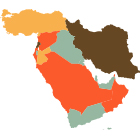Feasibility Study for Municipal Water Provision to informal tented settlements in the Northern Bekaa region of Lebanon
A mixed-methods research study considering the social, economic and political ramifications of municipal water provision to Syrian refugees and Lebanese host community households in Lebanon’s Northern Bekaa region.
In the Northern Bekaa water resources are limited in terms of quality and quantity, even when provided through public water networks. The massive influx of Syrian refugees residing in informal tented settlements (ITSs) has only exacerbated water provision problems to both Lebanese and Syrians. Refugees residing in ITSs are amongst the most vulnerable refugee populations that continue to be highly dependent on international humanitarian aid for assistance and water service provision. Consequent to the inadequate access to safe water services, a substantial impact on the household expenditure and economy of both Syrian refugees and Lebanese host communities takes hold. Hence, a multilevel approach to water management and infrastructure development that encourages the sustainable and equitable use of water resources is fundamental to tackling economic development and counteracting potential conflicts.
In order to identify and potentially resolve the obstacles facing the extension of piped water network to ITSs in the Northern Bekaa, Oxfam GB commissioned Triangle to conduct a financial, social and legal feasibility study of ITS and host community water provision in nine villages of the Northern Bekaa. The study is the first of its kind to model supply, consumption and willingness-to-pay through a mixed-methods approach which encompasses social, political and economic aspects of municipal water provision in these nine villages.
Link to Report
Project:
Feasibility Assessment for Water Service Provision to Informal Tented Settlements (ITS) in Northern Bekaa
Location:

Service type:
Quantitative Research, Qualitative Research, Policy Advisory